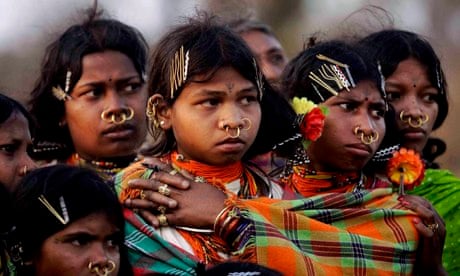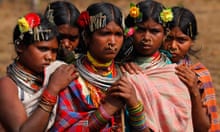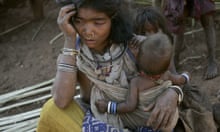India's decision to reject a London miner's request to mine bauxite on tribal land marks a major victory for human rights in the country.
For too long, tribal communities have been pushed off their land in the name of development and industrialisation, their attempts to defend their lands brushed aside or brutally suppressed.
The Dongria Kondh's determination to protect Niyamgiri hills from the mining heavyweight Vedanta Resources has paid off, despite the state government's complicity in the $2bn project.
Like many tribal communities worldwide, the Dongria have a strong connection to their land. They have expert knowledge of local forests, plants and wildlife – families grow more than 100 crops and gather food from the forests including mangoes, mushrooms and honey.
The 8,000-strong community has been campaigning against the mining project for almost a decade amid alleged intimidation by paramilitary police and local goons.
Many locals and organisations, including activists and international groups including Survival and Amnesty International, have worked hard to amplify the Dongria's voices. They understood this was a David and Goliath-style battle of India's tribal people fighting to protect their ways of life, and the integrity of their forests, from the wanton industrialisation that would destroy them.
The pressure on Vedanta was increased by Survival's complaint to the UK government under the Organisation for Economic Co-operation and Development guidelines for multinational companies, which in turn helped persuade many important shareholders, including the Church of England, to disinvest on ethical grounds from a company that had become notorious for the Niyamgiri project.
In 2010 the Indian government blocked Vedanta's bid to build the mine. And, finally, last April, India's supreme court ordered that affected communities must be consulted about the project before it could go ahead. In what was described as the country's first environmental referendum, the Dongria unanimously rejected Vedanta's proposal during 12 village consultations in August.
The central government and the supreme court bucked the trend of siding with industry, and defended the Dongria's right to their lands, their livelihoods and to determine their own future. And the environment ministry's decision to block Vedanta should serve as a warning to any company intent on extracting resources from tribal land without members' informed consent.
Vedanta has learned this the hard way. It opened a refinery to turn Niyamgiri's bauxite into aluminium before receiving approval for the mine, and has lost millions of pounds as a result.
Some commentators are angry that such a small tribe has been able to derail a major industrial project. But the benefits of the scheme would have lined the pockets of very few, while the devastation of the Dongria and their homeland would have been irreversible.
The landmark decision also flies in the face of those who believe that so-called backward or primitive tribes should be "developed" and join the mainstream.
Vedanta tried repeatedly to insist that the mine would help bring "development" to the Dongria, but seemed to overlook the fact that the construction of an open-pit mine would devastate their mountain, therefore achieving little in the form of development for the tribe. The initiatives that would accompany the projects were all oriented towards permanently altering the Dongria's way of life and independence.
As the Dongria leader, Lodu Sikaka, put it: "We'll lose our self-esteem if they take away our hills and forests. Other Adivasis [India's tribal peoples] who have lost their homes are dying of desperation; they are being destroyed. Earlier they used to till their land but now they are only drinking without working. They have become kind of beggars."
The Dongria case was about much more than the community and their homeland. India has been studying the events closely as a litmus test for its democracy. It raises the following questions: when citizens reject such projects strongly, peacefully and tirelessly, should the state be allowed to bulldoze ahead with its agenda? Should the rights of the people trump the interests of industry or vice versa?
The ministry's decision to ensure that some places can – and must – be off limits to mining restores hope that India will not abandon human rights in the pursuit of foreign investment – the rights of its people will – at least sometimes – be upheld.
Jo Woodman is a campaigner at Survival International, the global movement for the rights of tribal people. She co-founded the Proud not Primitive campaign that helps shape how tribes in India are perceived, discussed and treated





Comments (…)
Sign in or create your Guardian account to join the discussion